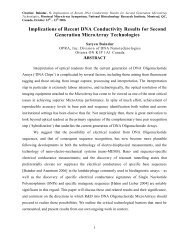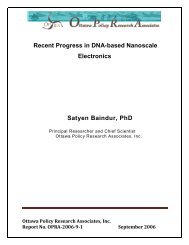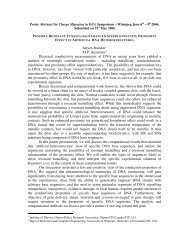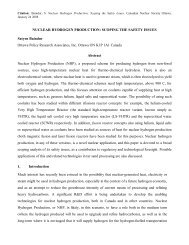Development Ethical and Societal Issues Satyen Baindur PhD
Ethical and Societal Issues - Satyen.Baindur.Org
Ethical and Societal Issues - Satyen.Baindur.Org
You also want an ePaper? Increase the reach of your titles
YUMPU automatically turns print PDFs into web optimized ePapers that Google loves.
Stewardship in Nanotechnology <strong>Development</strong>:<br />
<strong>Ethical</strong> <strong>and</strong> <strong>Societal</strong> <strong>Issues</strong><br />
SATYEN BAINDUR, PHD<br />
Ottawa Policy Research Associates, Inc.<br />
OPRA Report 2006-4-1 Issued April 2006<br />
------------------------------------------------------------------------------------------------<br />
The enhancement to human capacities that may result from nanotechnology will<br />
probably not happen all at once; a steady progress in that direction appears more likely.<br />
However, even incremental technological progress can lead to dramatic social <strong>and</strong> ethical<br />
issues coming to the fore. <strong>Ethical</strong> issues such as how equitable access to these kinds of<br />
interventions will be ensured will then become especially salient. Though similar issues<br />
about access are present in different health care settings today, they largely revolve<br />
around access to therapies. It is likely that when enhancements do become available, they<br />
might initially look a lot like therapeutic advances, introducing another complication. The<br />
other major ethical issue that will arise in the context of enhancements is the definition of<br />
what it means to be human, <strong>and</strong> a significant impediment in resolving this would be<br />
conceptually distinguishing: 1) enhancements that arise from evolutionary forces <strong>and</strong> 2)<br />
enhancements that arise through technology. Since technology is itself a product of the<br />
human mind, some will argue that the two kinds of enhancements lie on a continuum,<br />
while others will see a disjuncture.<br />
As an example, reversal of blindness from age-related macular degeneration (if<br />
successful) may be seen as therapeutic, but a reversal of congenital blindness, although it<br />
may be perceived as ethically correct - could be seen as an enhancement, especially if<br />
carried out in later life. Extending the example, it is conceivable that developments in<br />
nanotechnology would someday allow vision to be extended to the infrared spectrum,<br />
enabling natural night vision. However, since deterioration of night vision is also agerelated,<br />
the initial beneficiaries might be older people, who will likely see it as a<br />
therapeutic advance. A virtually identical product, or even the same product, might,<br />
however, provide an enhancement to younger people with ‘normal’ human night vision.<br />
Such developments will introduce complex new regulatory <strong>and</strong> ethical issues. Some of<br />
these types of issues have begun to come up already in the context of gene therapy,<br />
where the boundary between therapeutic advances <strong>and</strong> enhancement is no longer clearcut.<br />
11<br />
11










